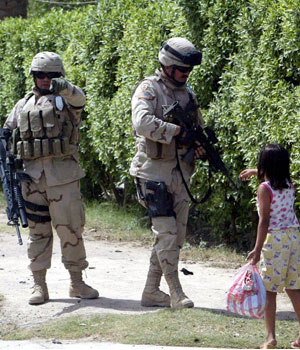
US soldiers prevent people from entering the scene where a car bomb exploded in al-Yarmouk district in western Baghdad, 13 June 2005 (EPA)
BAGHDAD, Iraq, AP – The military announced the killing of four more U.S. soldiers over the weekend, pushing the American death toll past 1,700 — more than double what it was a year ago. Since last June 13 — when 825 members of the U.S. military had died in Iraq — the insurgency that took shape with the fall of Saddam Hussein has increased its toll on American forces and Iraqi soldiers and civilians alike.
Iraq has fulfilled a number of key goals set by the Bush administration, including historic elections, a new government and the drafting of a new constitution. But the deaths continued.
On Monday morning, an explosion rocked a neighborhood in Samarra as an American-Iraqi patrol was passing by, police Lt. Qassim Mohammed said. Three policemen were killed in the blast, which was followed by a 30-minute gunbattle, Mohammad said. The U.S. military had no details on the explosion in the city 60 miles north of Baghdad.
On Sunday, police found the bullet-riddled bodies of 28 people — many thought to be Sunni Arabs — buried in shallow graves or dumped along streets on the outskirts of Baghdad.
And four more American soldiers were killed Saturday in two roadside bombings west of Baghdad, the military said, increasing the number of U.S. forces to die since the war began in March 2003 to at least 1,701 — with at least 1,297 as a result of hostile action. The figures include five military civilians.
Rep. Walter Jones (news, bio, voting record), a North Carolina Republican who voted for the war, told ABC”s "This Week" that he will join congressmen introducing legislation this week calling for a timetable for the withdrawal of American troops from Iraq.
"I just feel that the reason of going in for weapons of mass destruction, the ability of the Iraqis to make a nuclear weapon, that”s all been proven that it was never there," Jones said Sunday. "I feel that we”ve done about as much as we can do."
When President Bush declared that major combat operations in Iraq had ended on May 1, 2003, 138 members of the U.S. armed forces had died. That marked the halting beginning of the Sunni-dominated insurgency that caught American planners and the military off guard.
That insurgency has also killed at least 12,000 Iraqi civilians — most of them Shiites — in the past 18 months, Iraqi Interior Minister Bayan Jabr has said. The Shiite-led government has nonetheless pressed for disarmament talks with insurgents responsible for the relentless violence that has assumed ominous sectarian overtones.
A crackdown by Iraqi security forces in Baghdad and U.S. offensives in western Iraq has only temporarily blunted the carnage in which at least 940 people have died since Prime Minister Ibrahim al-Jaafari announced his government six weeks ago.
Al-Jaafari”s spokesman Laith Kuba said many militant groups were reaching out to the government. He urged them to lay down their arms.
The offer did not include foreign extremists such as Jordanian-born al-Qaida in Iraq leader Abu Musab al-Zarqawi because "they only want to kill," Kuba said.
Al-Zarqawi”s group has claimed responsibility for multiple suicide bombings, including Saturday”s attack inside Baghdad”s heavily guarded Interior Ministry headquarters. That attack killed at least three people and targeted the feared Wolf Brigade, a Shiite-dominated commando unit that Sunnis claim is killing members of their community.
A late Sunday gunbattle in western Baghdad killed an Iraqi soldier and a civilian caught in the crossfire, said Dr. Mohammed Jawad of Yarmouk Hospital.
In the volatile town of Tal Afar where a U.S.-Iraqi offensive to rout terrorists has been launched, three mortar rounds missed an Iraqi army barracks and landed on a house Sunday, killing a 6-year old child, police Capt. Amjad Hashim said.
In one of Sunday”s bright spots, the French journalist Florence Aubenas and her Iraqi assistant Hussein Hanoun al-Saadi returned home after five months in captivity.
Aubenas left Baghdad in the middle of a sandstorm that had closed the capital”s international airport for two days. Al-Saadi received a hero”s welcome — hugs and kisses from more than 60 relatives and friends at his southern Baghdad home. A band of trumpets played Arab tunes and a sheep was slaughtered to celebrate his homecoming.
On her return to France, the veteran reporter for the Liberation newspaper said she had been held in an Iraq cellar in "difficult conditions," tied up and with little water. French officials said no ransom was paid.
In northern Iraq, the 111-member Kurdish Parliament unanimously elected veteran guerrilla leader Massoud Barzani to be the first president of Iraq”s northern Kurdistan region. Barzani will also lead the 100,000-member Kurdish Peshmerga militia.

US soldiers arrest a suspected Iraqi construction worker close to the area where a roadside bomb targeted at a US military convoy, killed one US soldier 11 June, 2005 (AFP)

A US soldier of Delta Company inspects a 9mm pistol seized from an Iraqi arrested under suspicion of being part of a rebel group preparing a car bomb attack on the southern outskirts of Baghdad, 8 June, 2005 (AFP)
